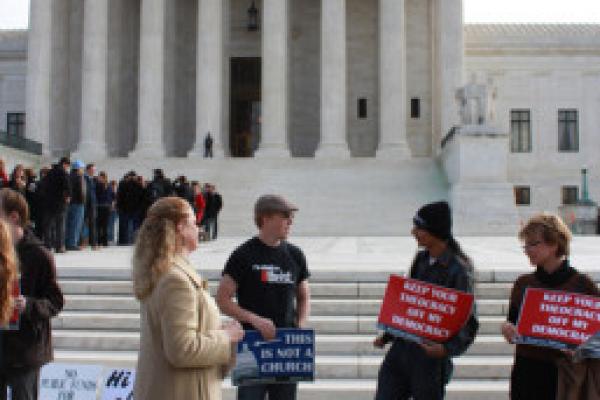A new report on the “Shifting Religious Identity of Latinos” reads very much like a biography of Fernando Alcantar.
But once he moved to California after high school, his faith journey diverged — and derailed. Today, Alcantar, 36 calls himself a humanist.
The Pew survey report released Wednesday is subtitled: “Nearly One in Four Latinos are former Catholics.” And Alcantar is one of them.


Our fearless driver, Jacque, is a security guard. He speaks with an eloquent French accent. His words are few, but every now and then he’ll tell us a pertinent and profound fact as we drive. The tone of his voice perfectly narrates our scenic drive — whether we’re driving along the backroads of Rwanda’s hills, cruising peacefully through Kigali, or chasing elephants.
His story comes out in pieces:
When the genocide hit in 1994, Jacque was in high school studying in Kibeho, a beautiful village known for apparitions of the virgin Mary. He fled for another town to find safety with his family. The first time he’s been back to Kibeho was 20 years later, with us.
His son is now in high school at a boarding school. On our way from Kibeho, we stopped to say hello so that Jacque could give him money. Jacque was beaming with pride when he introduced us to his son.
Jacque also has a 3-year-old daughter — she’s the cutest thing.
When we visited Kigali’s Genocide memorial, Jacque stayed in the car. We found out later that the bodies of his wife’s parents are buried in the mass graves there.
His wife barely escaped death herself. When she was just 9 years old, her village was raided by the interahamwe who savagely hacked apart bodies, her parents’ included. As the genociders were merely Hutu youth who knew little about taking one’s life, victims were left beaten, mutilated, bleeding profusely — left to die. Thinking they had finished the job, the interahamwe threw all of the “dead” Tutsi bodies into a pile and moved on to the next village. She was one of the bodies — broken, but not dead. She was just a little girl — her body thrown into darkness among hundreds of other broken, bloody, and hacked-apart bodies.
When the interahamwe left, her classmate, neighbor, and friend, a Hutu, went back. She couldn’t bear the thought of losing any more of her friends to the blood-stained hands of her tribe members. She went back to dig through the piles of bodies — desperately searching for any semblance of life from the friends she held most dear. There, she found her dear friend, still grasping for breath, clinging to life, refusing to be consumed. In that moment, I can only imagine the overwhelming relief as the pendulum swung from sorrow to joy as they looked into each other’s eyes and identified with each other — literally finding life in death and hope in the midst of pain. Jacque’s wife survived only by the hopeful expectancy of a friend who intentionally went back into the destruction to pull out the life within.
Confession: I cannot say the books of the Bible in order. Sometimes I still feel embarrassed when I have to flip around a little bit to find a certain book or, even worse, use the table of contents. It seems like I was supposed to learn this Christianity-defining skill at some point in my upbringing (preferably to the tune of a cutesy song or chant), but I never did. I am 28 years old, a teacher, and have a master’s degree, yet beyond the first few books after Genesis and “Great Electric Power Company” (Galatians-Ephesians-Philippians-Colossians), I get mixed up.
The realization that the order of the books does not particularly matter, then, comes with a bit of relief and freedom. In the Protestant canon, the Old Testament books are arranged by category (law, history, poetry, major prophets, minor prophets). The New Testament books are similarly arranged by type (Gospels, history, Paul’s letters, general letters, and prophecy). The Great Electric Power Company and friends — I mean, Paul’s letters — are actually arranged by length!
Certainly, there are reasons for knowing the order of the books in the Old and New Testament. It is simply more efficient to know exactly where to find a book. Knowing the names of all of the books does give you a general familiarity with our sacred text. These reasons, however, are functional, not crucial to one’s faith or salvation.
Long before head coach Doc Rivers found himself defending his Los Angeles Clippers players who were the unwelcome participants in team owner Donald Sterling’s racist comments all week, he was concerned about another sensitive subject: religion.
It was late 1999, the start of Rivers’ first season as coach of the Orlando Magic, and he saw a situation in the locker room that he felt needed to be addressed.
As his players took part in the pregame prayer that was part of their routine, Rivers noticed something he didn’t like.
“I looked up in one of the prayers, and Tariq [Abdul-Wahad] had his arms folded, and you could see that he was really uncomfortable with it,” Rivers said. “So the next game, we were standing up in a circle, and I said, ‘Hey guys, we’re no longer praying.’”
The Vatican has effectively addressed the “worldwide scourge” of clerical sexual abuse over the past decade and promoted the reporting of allegations to both church and legal authorities, a United Nations panel heard on Tuesday.
Tomasi faced intense questioning from members of the U.N. committee investigating whether the church upholds the U.N. convention against torture beyond the walls of the world’s smallest country, the Vatican City state.
On Monday, the U.S. Supreme Court ruled that a city, town, or county could open its regular meetings with a sectarian (that is, Christian) prayer without violating the First Amendment’s Establishment Clause. Not unexpectedly, the much-anticipated Town of Greece v. Galloway decision split the court 5-4. It is, for that and other reasons, a less than satisfying decision.
Khatoon Shaikh had no formal education, never worked outside the home, and lived in the kind of neighborhood that many people might call a slum.
But when Shaikh witnessed her sister-in-law victimized, first at the hands of a violent husband, and again by a patriarchal justice system, she took charge.
Shaikh started her own Shariah adalat, a court based on Islamic law, just for women.
“We needed a place where women’s voices could be heard,” the mother of seven said.
That was 20 years ago. Since then, the court has moved from Shaikh’s home to a two-room office in the north Mumbai neighborhood of Bandra. And it now operates within a broader organization called BMMA, or Indian Muslim Women’s Movement, which Shaikh helped form in 2007.
“Innovation” is a warm and fuzzy word — until you dig inside it.
It’s like “community,” a warm and fuzzy term when taken to mean friendships, sharing, common interests, common values, perhaps working together.
But from a gospel perspective, “community” means much more. As Jesus modeled community, it means mercy — turning away from our instinct to judge and to punish. It means compassion — giving to the least, even when our instinct is to disdain.
Anti-Muslim hate speech on the Internet is commonplace and can motivate some people to commit acts of violence against Muslims, according to a report released Tuesday by Muslim Advocates, a legal and advocacy group in San Francisco.
The report contains examples of hate speech and how it can lead to violence, as well as how victims of online hate speech can report it and counter it. The report aims to help educate parents, students, youth, community leaders, Internet companies, and policymakers on how to counter online hate speech.
Catholic nuns in the U.S. have been thumbing their nose at Rome’s demands to toe the doctrinal line and they need to obey or face serious consequences, the Vatican’s enforcer of orthodoxy said in a surprisingly tough talk to women representing most American sisters.
Mueller said the LCWR — which represents about 80 percent of the more than 50,000 Catholic nuns in the U.S. – is dependent on the Vatican for its bona fides as a church body. He indicated that the group’s status, and the Catholic faith of the sisters, was at risk if they did not heed Rome’s directives.








